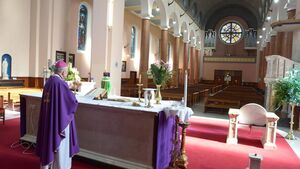We need to reimagine the Sunday Mass

The then Archbishop of Tuam Dr Michael Neary celebrated Sunday Mass in an empty St Mary's Church in Westport during the Covid-19 lockdown. In the absence of a congregation, the Mass was broadcast online and on radio. Picture: Frank Dolan
The virtual disappearance of Sunday as a day apart has crept up on us through a growing secularist approach to life in Ireland evident by an accompanying steep decline in Mass attendance. This drift has been fuelled by two factors: one, the child sexual abuse scandals and the inadequate response to them; and, two, the Covid-19 lockdown. The first had a devastating effect on the trust that for so long so many had invested in the Catholic Church and its authority. The second effectively cancelled Mass for an extended period and not going became a habit.
The abuse issue for many Catholics represents a betrayal of trust and a loss of the authority and credibility of the Church and, for them, there is no undoing that overarching block to retrieving their lost allegiance. The Covid experience created an unexpected challenge to the faith as the habit of going to Sunday Mass blended almost subconsciously into the habit of not going to Sunday Mass. Habit can be a false friend. And the sad conclusion after honest reflection by many decent believers was a genuine sense that they don’t really miss Mass anymore – and many are struggling to understand why.
The result is a present level of attendance at Sunday (or now weekend) Mass that bears little or no comparison to the past. It’s hard to credit that just a few decades ago, surveys were indicating weekly Mass attendances at 90% or in some places even higher. Now some parishes in Dublin, through a combination of the above and other factors, rate practice as low as 3%.
Last Sunday, in a timely intervention, the Irish Bishops sent a message to the Catholics of Ireland warmly inviting them ‘to reflect on the immense significance of the Sunday Mass’, including an invitation to those who, even if they no longer attend church, might ‘consider returning to Mass’. The Mass, they continued, is ‘a profound privilege’ through which ‘we experience God’s love in a deeply personal way’.
Clearly placing a focus on Sunday Mass is important not just because as Catholics we’ve always underlined it’s centrality – ‘It’s the Mass that matters’ (as we’ve always said) – but also because of the obvious decline in numbers attending church and the loss, as the bishops point out, that this represents at both a personal and community level.
I’ve thought long and hard about this subject, even to the extent of writing a minor thesis under the title ‘We need to talk about Sundays’. I’ve discussed it sometimes long into the night not with people who have made their decision to distance themselves from the church but with those who are holding on grimly by their finger-tips – not to their faith but to the Church.
This group of critical (in the best sense) Catholics are gradually becoming more and more disaffected with the Church while clinging to the person of Jesus Christ. They are not people who don’t go to Mass because they would prefer to go cycling on Sunday mornings. Or because the choir in their local church are singing too much or too little. Or for whom religious practice (as with so many) is now confined to the cliche of baptisms, funerals, weddings and Midnight Mass at Christmas.
No, these are Catholic men and women (but predominantly women) who are convinced that the Mass in their local church is no more than a pale image of what it might be. A favoured phrase is ‘It doesn’t have to be this way’. And it’s not that they’re looking for significant standards of excellence. They don’t expect their priest to be a wonderful preacher but they’d like him to use words that they can understand and not preach for 20 minutes or to preach several sermons during the Mass. They would like to have the full complement of Readers, Lay Ministers, a choir and so forth rather than to have to accept what the priest decides is what they will get. And they would like if, as a basic minimum, the church was heated properly and the priest could be heard.
They don’t even want what the Irish Catholic faithful have long treasured – ‘a fast Mass’. They long for a more creative, imaginative and varied Mass that speaks to ‘real life’, that places a focus on involving the many gifts of as many people as possible and that raises the siege of unvaried repetition that their teenagers accurately describe as ‘boring’! They want a Mass for adults that is taken as seriously as a Mass for children where language, participation and planning would give new life to what has become a tired formula. Not a Mass where the priest by dint of sheer repetition over many years of service can be a study in inevitable weariness.
Changes could be made: by shortening sermons; by allowing competent lay people to say a few words; in the choice of Readings; in the choice and extent of music/singing; in a better balance between words and silence; by having special Masses to mark special family occasions; by drawing on the gifts of the community and encouraging as wide and as full a participation as possible; and above all by sourcing ready themes for Sunday Mass liturgies from the lived impulses of the everyday lives of the people.
Now, thankfully, there are straws in the wind that create a real possibility of change and reform. The recent Synod decided that Parish Councils will now be mandatory; the focus is now on synodality – people and priest working together, discussing together; discerning together and deciding together – as the way the church will operate in the future; and now the focused interest of the Irish bishops that we need to do about Sundays.
At long last, it might be said, the necessary ducks are being lined up in a row.




